Key takeaways:
- Cannabis discrimination can manifest in various contexts, including employment and housing, often impacting individuals’ self-esteem and social interactions.
- The patchwork of cannabis laws in the U.S. creates inconsistency, complicating the lives of individuals and those in the cannabis industry.
- Stigma surrounding cannabis affects personal and professional growth, leading individuals to censor their experiences to avoid judgment.
- Strategies to address discrimination include community engagement, education, and leveraging social media to raise awareness and foster inclusivity.
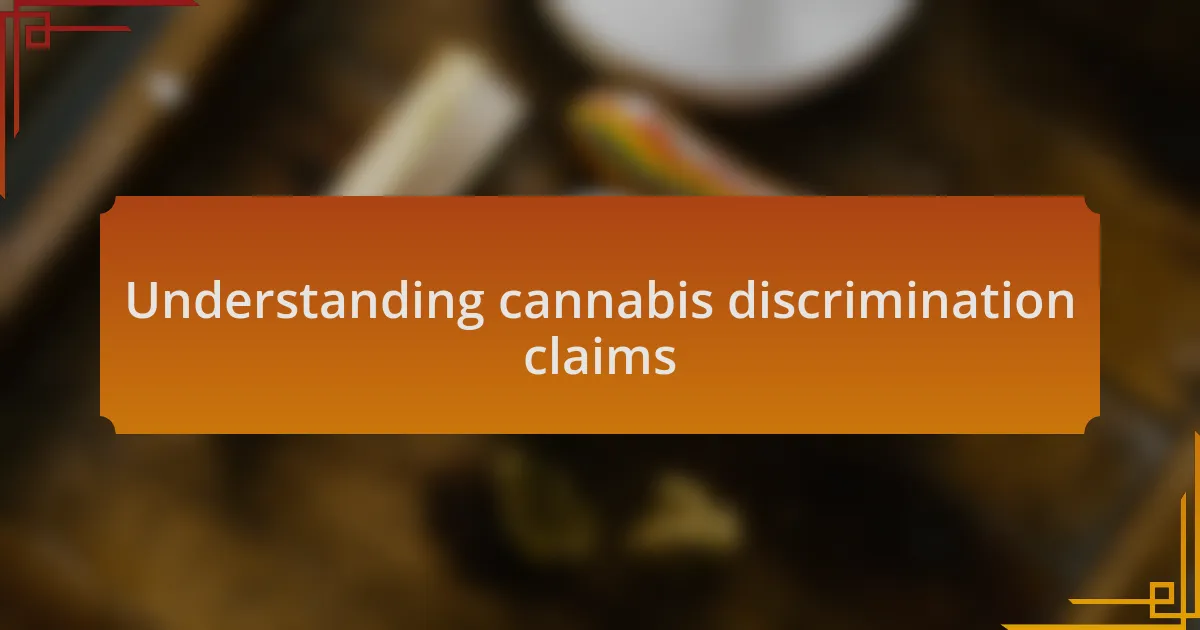
Understanding cannabis discrimination claims
Cannabis discrimination claims arise in contexts where individuals face unfair treatment due to their cannabis use or association with the cannabis industry. For instance, I once witnessed a friend lose a job opportunity simply because he openly discussed his medicinal cannabis use during an interview. It made me reflect on how societal perceptions of cannabis still influence professional settings.
When I think about the emotional weight of cannabis discrimination, it’s hard not to feel a sense of injustice. Have you ever felt judged for a personal choice? Many individuals navigating these claims often battle not just external discrimination, but internal feelings of shame or confusion about their relationship with cannabis. The stigma surrounding it can be deeply ingrained, impacting self-esteem and social interactions.
Understanding cannabis discrimination means recognizing that it can manifest in various ways, from employment to housing. I remember hearing stories from people who faced eviction simply for their legal cannabis use, which left me questioning how laws meant to protect can still fail to shield against blatant bias. It’s a complex issue, and unpacking these layers is essential for driving the conversation forward.
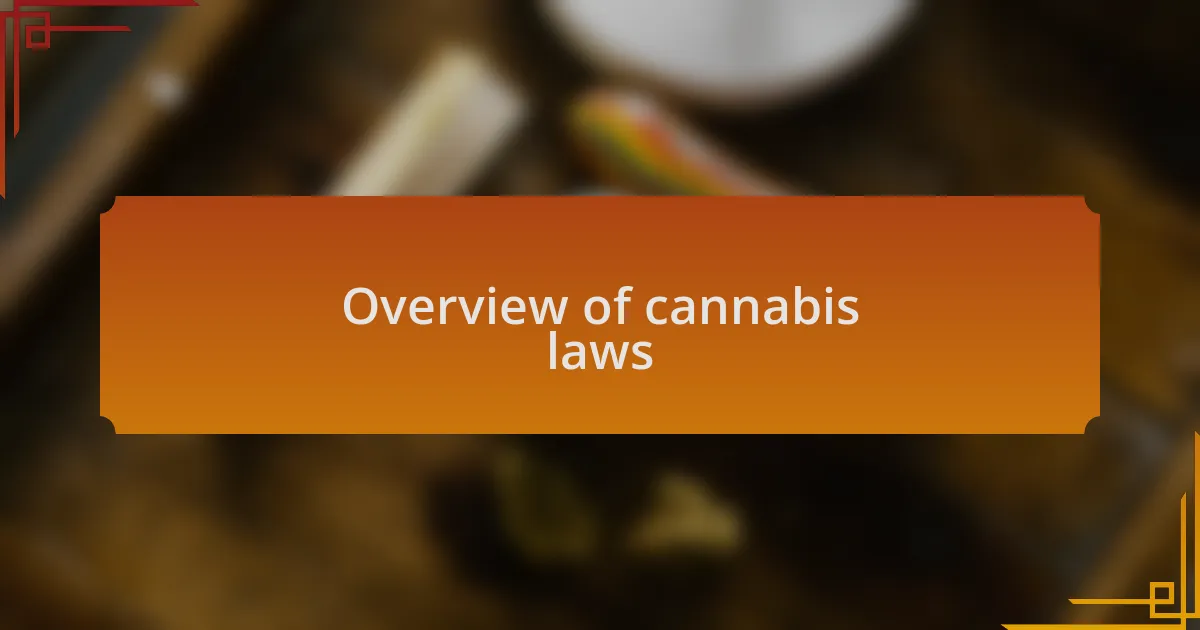
Overview of cannabis laws
Cannabis laws in the United States have evolved dramatically over the past few decades, and yet, they remain a patchwork of regulations that vary significantly by state. For example, while some states have fully legalized cannabis for recreational use, others still impose strict penalties for possession. It’s bewildering to think about how one can be considered a law-abiding citizen in one state, while facing criminal charges just a border away.
Reflecting on my experience, I remember a time when I traveled to a state where cannabis was illegal. I felt a mix of anxiety and confusion. How could something that was legal in my hometown suddenly be a cause for concern? This illustrates the unpredictable nature of cannabis laws and how they can impact individuals differently depending on where they live or work.
Despite increasing acceptance, cannabis remains illegal at the federal level, which complicates matters further. I found myself wondering, how does this disconnect affect those in the cannabis industry? The lack of cohesive national legislation creates obstacles that affect investment, employment, and even personal freedom for those involved. Understanding these laws is crucial, especially for those who are facing the realities of discrimination claims.
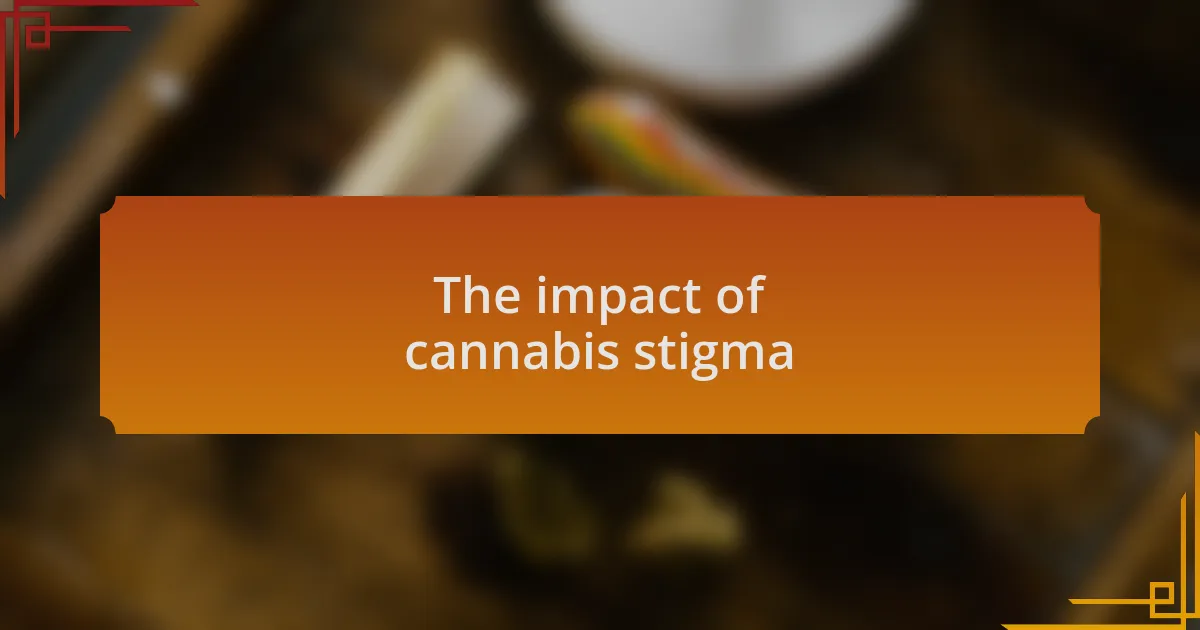
The impact of cannabis stigma
The stigma surrounding cannabis has profound effects beyond mere legalities; it infiltrates social perceptions and personal interactions. I remember the apprehension I felt discussing my cannabis use with peers. Their reactions, ranging from skepticism to outright disapproval, highlighted how ingrained these biases are in our culture. It made me question if my choices would lead to social ostracism or professional repercussions.
Moreover, I’ve witnessed the impact of stigma in the workplace. Colleagues who openly acknowledged their cannabis use often faced whispers and judgment, which created a chilling atmosphere where honest conversations about wellness and personal choices were stifled. Isn’t it ironic that something hailed for its therapeutic benefits can also lead to alienation? This disconnect is a reminder that acceptance must evolve hand-in-hand with legalization.
Personally, I’ve felt my own career prospects dimming in environments where cannabis use was viewed negatively. When pondering future job opportunities, I often found myself censoring my experiences. Would my history make me a liability instead of an asset? This internal conflict underlines a significant issue: stigma not only shapes societal views but can also limit personal and professional growth for many individuals navigating the cannabis landscape.
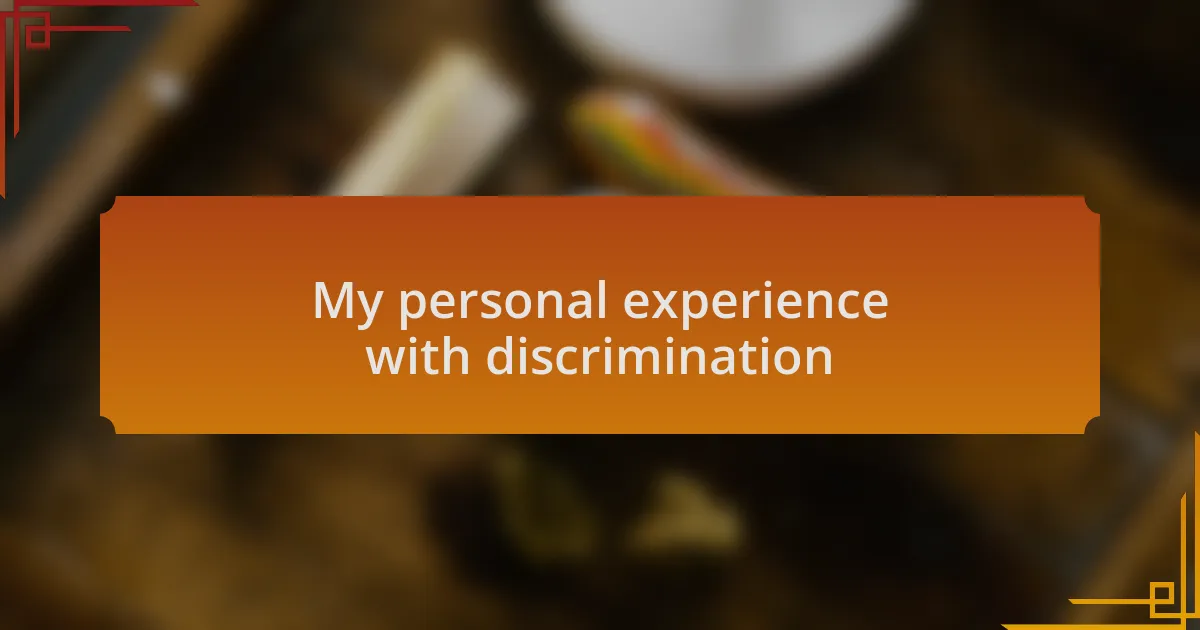
My personal experience with discrimination
I vividly recall an incident at a social gathering where the topic of cannabis came up. As I shared my positive experiences, I could feel the room shift. Faces turned to masks of judgment, and snide remarks followed. It felt surreal, almost as if I had confessed to a crime. That moment reminded me how deeply rooted the biases against cannabis are, even in casual settings.
In my professional life, I faced a particularly disheartening scenario during a job interview. When a potential employer asked me about my hobbies, I hesitated to mention my cannabis use. The silence that followed my answer spoke volumes. I could sense a change in their demeanor, and I left feeling as though my authenticity had knocked me out of contention for the job. Isn’t it disheartening to think that my personal choices could be seen as disqualifying factors?
One of the hardest lessons I learned was understanding the isolation that comes from cannabis discrimination. There are moments when I sat alone, reflecting on how society views cannabis users as untrustworthy or irresponsible. This feeling can be incredibly lonely, especially when I know the benefits cannabis has brought to my life. It makes me wonder: when will society see beyond the stigma and recognize the human stories behind cannabis use?
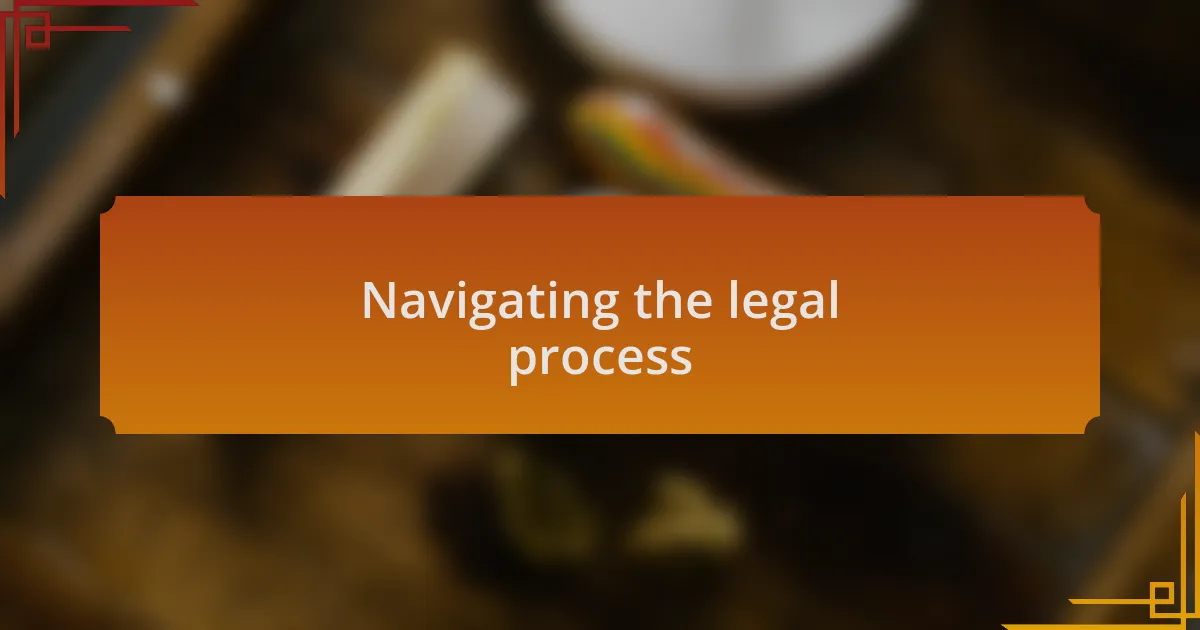
Navigating the legal process
Navigating the legal process regarding cannabis discrimination can feel overwhelming, particularly when you lack support. I remember sitting with a lawyer, anxious about how my experiences would be perceived in a court of law. There was an intricate dance of understanding legal jargon, and I often found myself wondering how these terminologies could translate to my story of discrimination.
It’s essential to document every interaction that contributes to your case. I made a habit of journaling my experiences, noting dates, comments, and reactions. This practice not only helped clarify my thoughts but also strengthened my case, making it easier for legal professionals to understand the nuances of my situation. Have you ever thought how powerful your own words can be in building a case?
As I moved through the legal intricacies, I often felt like an advocate for myself. It was not just about fighting discrimination, but also about reshaping perceptions. Every meeting with legal advisors brought a mix of hope and challenges, reminding me that each step taken was vital in dismantling outdated viewpoints. Isn’t it empowering to know that your journey could influence others who are silenced by stigma?
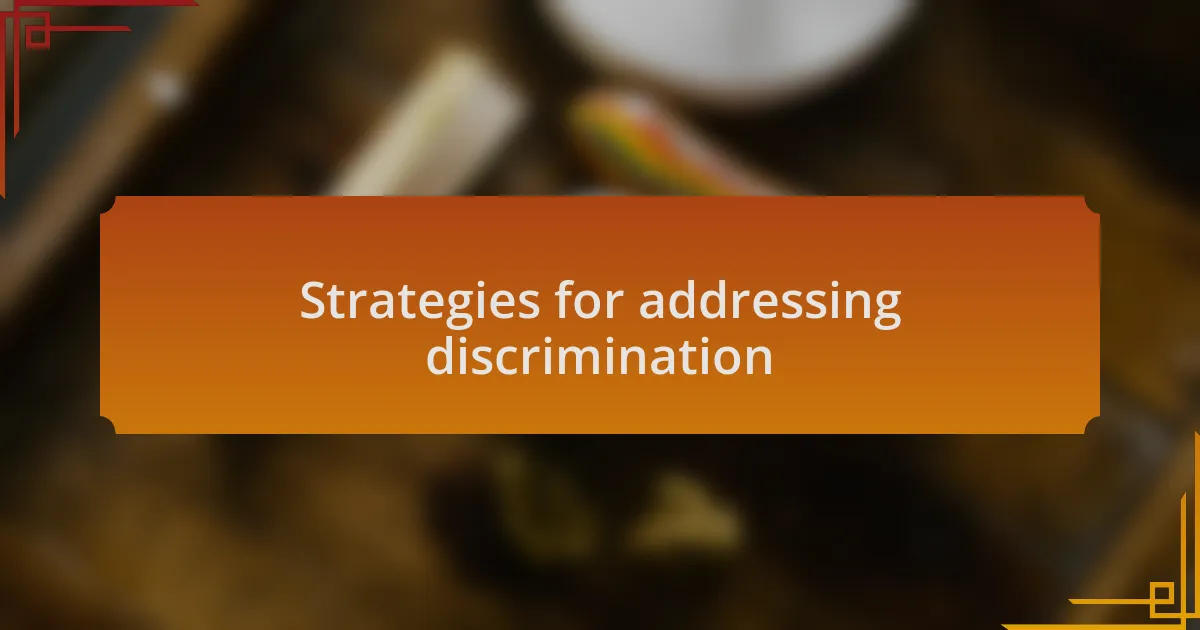
Strategies for addressing discrimination
Addressing discrimination often requires a multi-faceted approach. One effective strategy I found was connecting with community organizations that advocate for cannabis rights. Sharing my story alongside others who faced similar issues not only amplified our voices but also provided a supportive network. Have you ever experienced the power of community in times of adversity?
Another key tactic is education—both for yourself and those around you. While participating in workshops and forums, I learned how to articulate my experiences and the broader implications of cannabis discrimination. This knowledge empowered me to confront misunderstandings directly and provide insight into the realities that many individuals face. Isn’t it fascinating how knowledge can transform not just your perspective but also how others perceive the issue?
A proactive approach is to utilize social media platforms to raise awareness. I started sharing my journey online, which opened up dialogues with people who had similar experiences. It was astonishing to witness the ripple effect of sharing personal stories. This strategy helps demystify cannabis-related issues, encouraging others to join the conversation and advocate for change. How often have you seen social media serve as a catalyst for social justice?
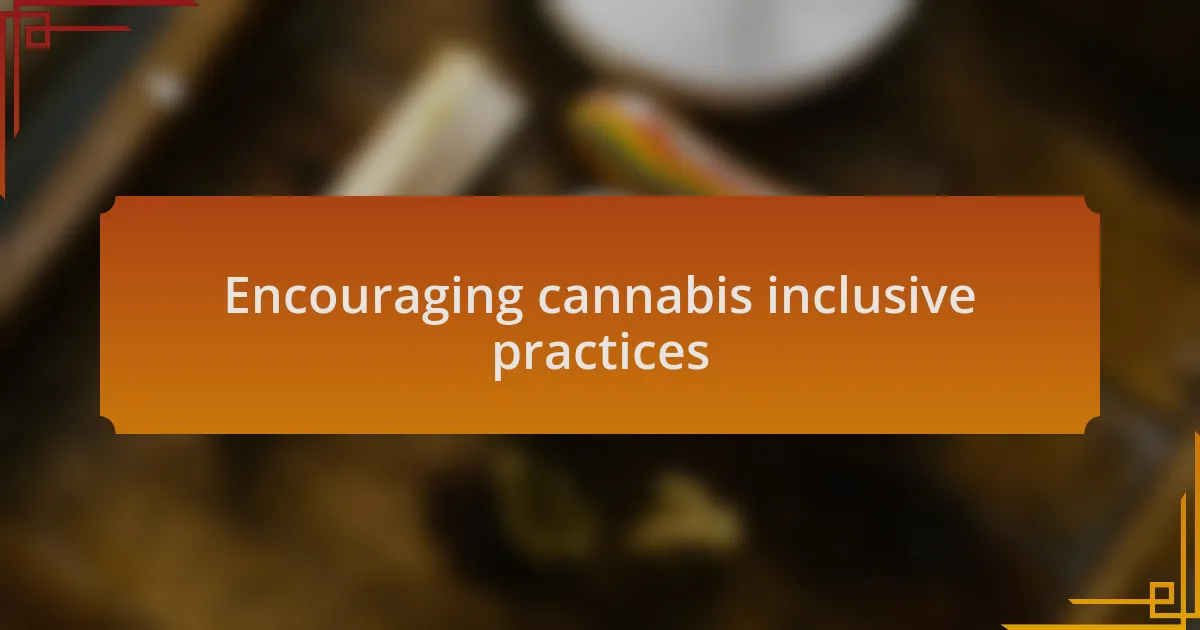
Encouraging cannabis inclusive practices
Encouraging cannabis inclusive practices starts with fostering understanding within our communities. I recall a community event I attended where advocates shared their personal experiences with discrimination. The atmosphere was charged with empathy and connection, revealing how vital it is to create spaces where everyone feels welcome to discuss cannabis without fear. Have you ever found solace in a supportive environment?
Moreover, implementing inclusive policies in workplaces can make a significant difference. I once worked for an organization that revamped its employee handbook to address cannabis use, emphasizing inclusivity and understanding rather than stigma. That shift not only improved morale but also encouraged open conversations amongst colleagues about their experiences and beliefs. Isn’t it powerful to see how policy changes can pave the way for greater acceptance?
Finally, collaboration among different sectors can really amplify the movement towards inclusivity. One of my impactful moments was when local businesses collaborated with cannabis advocates to host educational events. This initiative broke down barriers and fostered dialogue that benefited everyone involved. What better way to foster understanding than by working together across various platforms?